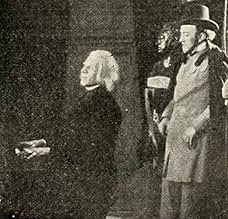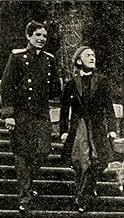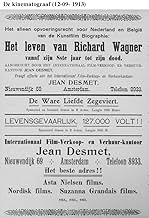Ajouter une intrigue dans votre langueThe story of the great German composer, from his childhood through his great triumphs in orchestral and operatic music.The story of the great German composer, from his childhood through his great triumphs in orchestral and operatic music.The story of the great German composer, from his childhood through his great triumphs in orchestral and operatic music.
- Réalisation
- Scénario
- Casting principal
Avis à la une
This biographical portrait of composer Richard Wagner (1813-1883), feature-length and lavishly produced, was released in conjunction with the centennial of his birth. It's an outstanding achievement in many respects. Naturally it looks primitive by modern standards, but contemporary viewers should bear in mind that it was made at a time when the motion picture industry was still in its infancy, and feature films were still a novelty. The producers of 'Richard Wagner' had few models to follow. By 1913 Italy's Quo Vadis and France's Queen Elizabeth (i.e. Les amours de la reine Elisabeth, starring Sarah Bernhardt) had been released and widely distributed, but I think it's fair to say that this German opus, which was filmed at some of the historic sites mentioned in the narrative, surpasses those films in cinematic sophistication.
A number of interesting individuals came together to create 'Richard Wagner.' German film pioneer Carl Froelich is the director of record, although it is said that the film's screenwriter and scenic designer William Wauer also served as his uncredited co-director. Like so many silent film artists in Germany, the paths of Froelich and Wauer diverged sharply in later years. Froelich joined the Nazi Party, and ran the official trade organization that controlled access to filmmaking under the Third Reich; Wauer, meanwhile, who was primarily a graphic artist, sculptor and essayist, left the movie business in the 1920s and did not join the Party. During the Nazi era, he was blacklisted and prevented from publishing or broadcasting his views on art or anything else. (Both men survived the war, and both remained in Berlin. If they met in the post-war era I'd imagine their encounters were not cordial.) But getting back to 1913 and Wagner: the title role was played by Giuseppe Becce, an Italian who not only resembled Wagner but was himself a gifted composer. Although he wasn't an actor, Becce gives a sensitive, nuanced portrayal in this demanding role, and his performance is notably understated by the standards of the day. Generally speaking, the performances in this film are restrained, without the "Great Train Robbery" style histrionics one might expect, especially in a story with an operatic theme.
The saga unfolds in episodic fashion, depicting significant moments in Wagner's life from his childhood to his death at age 69. Each scene is introduced with a title card announcing what will occur (a convention one often finds in early silent dramas), but there are no dialog titles within the scenes. At times, we learn what is happening when a character reads a letter or document of some sort, but otherwise, the sense of each sequence is communicated via pantomime—which, unfortunately, is confusing at times. On the plus side, the camera occasionally enters the action and gives us a close look at the actors' faces. Sequences depicting premieres of Wagner's operas, and their impact on audiences, are well staged. Brief highlights from the Ring Cycle are enacted on natural locations. Fantasies or dreams are conveyed through the use of rudimentary optical effects, reminiscent of the early "trick films" of Georges Méliès and his contemporaries. The most striking example comes early, when Wagner, still a young boy, has a dream in which two ladies in portraits hanging in his bedroom come to life, and step out of their frames. One lady starts to lead him in a minuet, but then the other sternly intervenes and stops the dance. Other scenes surprise us with unexpected devices: the mature Wagner, seen in silhouette in his bathtub, is suddenly struck with inspiration; he leaps up, wraps himself in a flimsy silk towel, and rushes to the piano to compose while still semi-nude.
The very notion of a silent movie about a composer may seem odd, but Wagner is an ideal choice, simply because his life was so tempestuous and dramatic. Wagner's personality was operatic, while his tumultuous love life unfolded like a soap opera. He knew great success and abysmal failure, luxury one day and poverty the next. He participated in the wave of revolutions that swept Europe in the late 1840s, and had to flee Germany under threat of arrest. At his nadir, he contemplated suicide. His career was eventually rescued by a Bavarian King who may or may not have been mentally ill. Eventually, the Bayreuth Opera House was built, and became a shrine of sorts to Wagner's genius, a temple where the crowned heads of Europe paid homage to the living legend. There's plenty of material here to work with, and it is a credit to the pioneering filmmakers who created this biopic that they managed to utilize so much of this real-life drama in a film that runs about 80 minutes—and at a time when the average movie ran no more than 10 or 15 minutes!
One final note: the DVD edition of this film that I've viewed features an optional commentary track by stage and film director Tony Palmer, who directed his own biopic of Wagner in 1982, starring Richard Burton as the composer. I can recommend the audio track to anyone interested in additional info about this film, the Burton version, or Wagner himself. Mr. Palmer comes across as charming and a little scattered (he sometimes mixes up names, or begins anecdotes he doesn't finish), but he is also interesting and informative without being pedantic. Significantly, considering that he's an expert on the man, Palmer describes Wagner's personality in harsh terms, calling him a "monster" and worse, but concedes that this was a case where indisputable genius resided in a despicable personality, something Wauer's screenplay suggests only ambiguously. Palmer's commentary track fills in some of the narrative gaps, corrects errors, and complements the experience of seeing this intriguing film.
A number of interesting individuals came together to create 'Richard Wagner.' German film pioneer Carl Froelich is the director of record, although it is said that the film's screenwriter and scenic designer William Wauer also served as his uncredited co-director. Like so many silent film artists in Germany, the paths of Froelich and Wauer diverged sharply in later years. Froelich joined the Nazi Party, and ran the official trade organization that controlled access to filmmaking under the Third Reich; Wauer, meanwhile, who was primarily a graphic artist, sculptor and essayist, left the movie business in the 1920s and did not join the Party. During the Nazi era, he was blacklisted and prevented from publishing or broadcasting his views on art or anything else. (Both men survived the war, and both remained in Berlin. If they met in the post-war era I'd imagine their encounters were not cordial.) But getting back to 1913 and Wagner: the title role was played by Giuseppe Becce, an Italian who not only resembled Wagner but was himself a gifted composer. Although he wasn't an actor, Becce gives a sensitive, nuanced portrayal in this demanding role, and his performance is notably understated by the standards of the day. Generally speaking, the performances in this film are restrained, without the "Great Train Robbery" style histrionics one might expect, especially in a story with an operatic theme.
The saga unfolds in episodic fashion, depicting significant moments in Wagner's life from his childhood to his death at age 69. Each scene is introduced with a title card announcing what will occur (a convention one often finds in early silent dramas), but there are no dialog titles within the scenes. At times, we learn what is happening when a character reads a letter or document of some sort, but otherwise, the sense of each sequence is communicated via pantomime—which, unfortunately, is confusing at times. On the plus side, the camera occasionally enters the action and gives us a close look at the actors' faces. Sequences depicting premieres of Wagner's operas, and their impact on audiences, are well staged. Brief highlights from the Ring Cycle are enacted on natural locations. Fantasies or dreams are conveyed through the use of rudimentary optical effects, reminiscent of the early "trick films" of Georges Méliès and his contemporaries. The most striking example comes early, when Wagner, still a young boy, has a dream in which two ladies in portraits hanging in his bedroom come to life, and step out of their frames. One lady starts to lead him in a minuet, but then the other sternly intervenes and stops the dance. Other scenes surprise us with unexpected devices: the mature Wagner, seen in silhouette in his bathtub, is suddenly struck with inspiration; he leaps up, wraps himself in a flimsy silk towel, and rushes to the piano to compose while still semi-nude.
The very notion of a silent movie about a composer may seem odd, but Wagner is an ideal choice, simply because his life was so tempestuous and dramatic. Wagner's personality was operatic, while his tumultuous love life unfolded like a soap opera. He knew great success and abysmal failure, luxury one day and poverty the next. He participated in the wave of revolutions that swept Europe in the late 1840s, and had to flee Germany under threat of arrest. At his nadir, he contemplated suicide. His career was eventually rescued by a Bavarian King who may or may not have been mentally ill. Eventually, the Bayreuth Opera House was built, and became a shrine of sorts to Wagner's genius, a temple where the crowned heads of Europe paid homage to the living legend. There's plenty of material here to work with, and it is a credit to the pioneering filmmakers who created this biopic that they managed to utilize so much of this real-life drama in a film that runs about 80 minutes—and at a time when the average movie ran no more than 10 or 15 minutes!
One final note: the DVD edition of this film that I've viewed features an optional commentary track by stage and film director Tony Palmer, who directed his own biopic of Wagner in 1982, starring Richard Burton as the composer. I can recommend the audio track to anyone interested in additional info about this film, the Burton version, or Wagner himself. Mr. Palmer comes across as charming and a little scattered (he sometimes mixes up names, or begins anecdotes he doesn't finish), but he is also interesting and informative without being pedantic. Significantly, considering that he's an expert on the man, Palmer describes Wagner's personality in harsh terms, calling him a "monster" and worse, but concedes that this was a case where indisputable genius resided in a despicable personality, something Wauer's screenplay suggests only ambiguously. Palmer's commentary track fills in some of the narrative gaps, corrects errors, and complements the experience of seeing this intriguing film.
Le saviez-vous
- AnecdotesDue to the high costs of copyright for Richard Wagner's pieces, which were not in public domain at the time of the movie's production, Giuseppe Becce, who played Wagner due to his resemblance to him, wrote an own score that resembles Wagner's composition and also sued elements from Joseph Haydn, Wolfgang Amadeus Mozart, Ludwig van Beethoven and Gioacchino Rossini. Today Becce's music is considered one of the first movie scores in the German cinema and opened a way for Becce to work as a composer. He was working on various movies until 1959, including movies like Der Spieler (1938), Le dernier des hommes (1924) or Peer Gynt (1934).
- GaffesThe time in which Richard Wagner was with his uncle Adolph and aunt Friederike in Leipzig was in 1822, not in 1823, as suggested in the movie as by that time he lived in Dresden.
- ConnexionsFeatured in La neuvième (2004)
Meilleurs choix
Connectez-vous pour évaluer et suivre la liste de favoris afin de recevoir des recommandations personnalisées
Détails
- Date de sortie
- Pays d’origine
- Langues
- Aussi connu sous le nom de
- The Life and Works of Richard Wagner
- Lieux de tournage
- Bayreuth, Bavaria, Allemagne(Villa Wahnfried)
- Société de production
- Voir plus de crédits d'entreprise sur IMDbPro
- Durée1 heure 50 minutes
- Couleur
- Mixage
- Rapport de forme
- 1.33 : 1
Contribuer à cette page
Suggérer une modification ou ajouter du contenu manquant

Lacune principale
By what name was Richard Wagner (1913) officially released in Canada in English?
Répondre
















